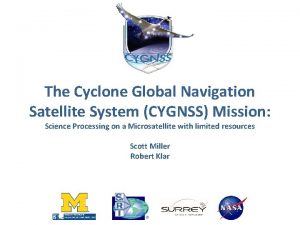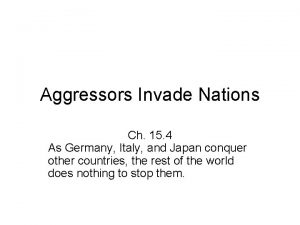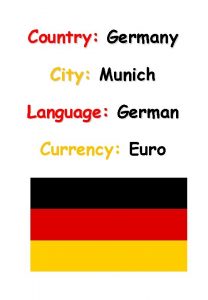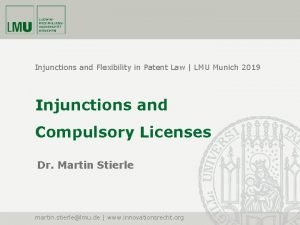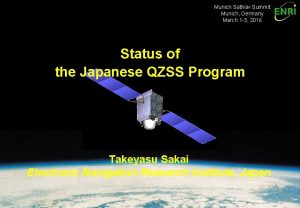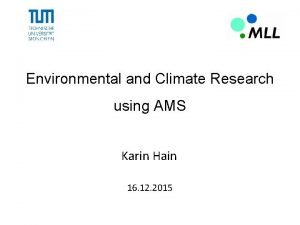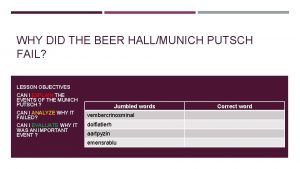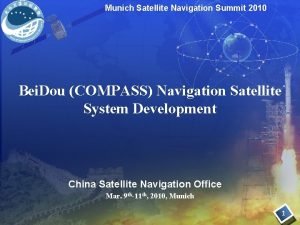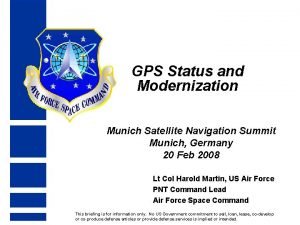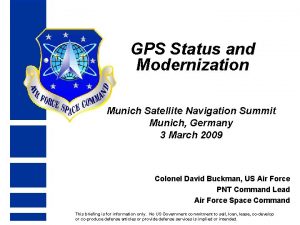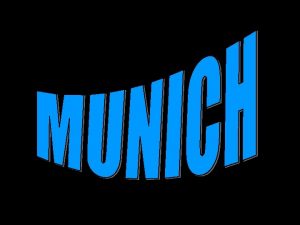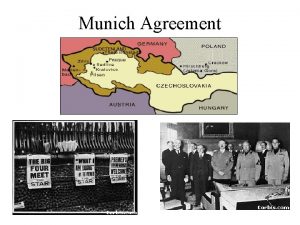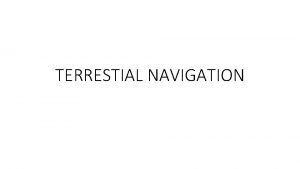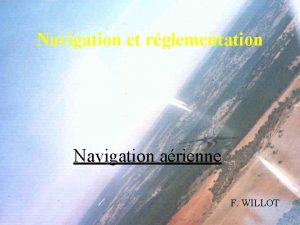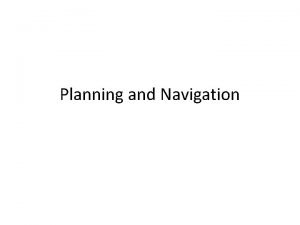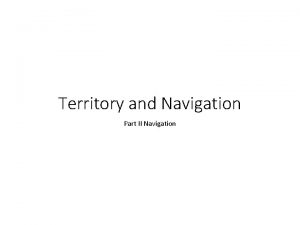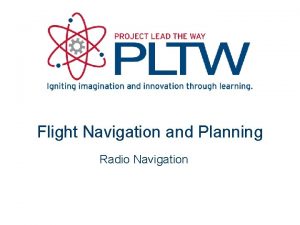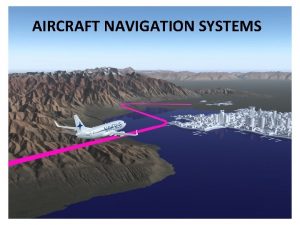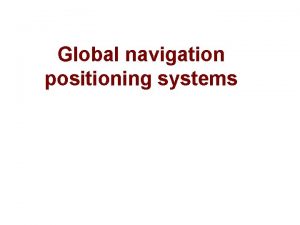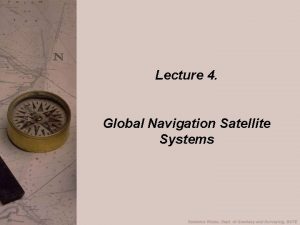The U S Scene of Satellite Navigation Munich























- Slides: 23

The U. S. Scene of Satellite Navigation Munich Satellite Navigation Summit 2007 Session 6 March 8, 2007 Michael Shaw, Director U. S. National Coordination Office for Space-Based Positioning, Navigation, and Timing (PNT)

Global Navigation Satellite Systems (GNSS) Expanding • Sep 2005 – first launch of new 2 nd civil GPS signal – Sustaining constellation with continued launches into the future • Dec 2005 – first Galileo test satellite – Projecting full constellation in 2010 -2012 • Dec 2005, Dec 2006 – launch of 6 GLONASS satellites – Building to full constellation by end of decade • 2006 – European EGNOS operational • Japan preparing for MSAS ops in 2007 and QZSS • India moving forward with GAGAN and IRNSS • China Bei. Dou, Compass coming on the scene Interoperability key to seamless global operations Munich Sat. Nav Summit, 8 March 2007 2

Purpose Focus on public and private sector initiatives and applications regarding GNSS from the U. S perspective 3 Munich Sat. Nav Summit, 8 March 2007

Session 6 – Overview • Overview of U. S. Space-Based PNT Policy and Programs – Mike Shaw • Geoscience Applications of GNSS within the U. S. – Gerald Mader Dr. • NASA GNSS Applications and Support to Geoscience Applications of GNSS – Ruth Neilan • U. S. Government Support to Commercial GNSS Applications –Dave Turner • Question and Answer Period 4 Munich Sat. Nav Summit, 8 March 2007

Status of U. S. Space-Based PNT Policy and Programs Munich Satellite Navigation Summit 2007 Session 6 March 8, 2007 Michael Shaw, Director U. S. National Coordination Office for Space-Based Positioning, Navigation, and Timing (PNT)

Today • Like the Internet, GPS/GNSS has become a critical component of the global information infrastructure – Scalable applications enabling broad new capabilities – Facilitating innovations in efficiency, safety, environmental, public security, and science • Over the past decade, GPS has grown into a global utility providing space-based positioning, navigation and timing (PNT) – Consistent, predictable, dependable policy and performance – Augmentations improve performance even further 6 Munich Sat. Nav Summit, 8 March 2007

GPS as a Global “Public Service” • Owned and operated by the U. S. Government – Acquired and operated by the U. S. Air Force on behalf of the U. S. Government – Managed at a national level as multi-use asset – Access to civilian GPS service is free of direct user charges • As well as USG GPS Augmentation services – Global GPS civil service performance commitment met continuously since 1993 • Public domain documentation – Available on an equal basis to all users and industry – Anyone has the opportunity to develop GPS user equipment • And to compete on the world market 7 Munich Sat. Nav Summit, 8 March 2007

GPS Augmentations • GPS is an Open Architecture service – Where GPS alone does not fulfill user needs, it can be augmented • Provides corrections/integrity warnings for safety and other applications to improve • Under individual country or regional control • U. S. Govt/other nations operate augmentations to enhance GPS performance, particularly for transportation safety – Space-based Augmentation Systems (e. g. WAAS) – Ground-based Augmentation Systems (Nationwide DGPS) – Continuously Operating Reference Stations (CORS), International GNSS Service (IGS), Global Differential GPS (GDGPS) • Commercial companies also offer local, regional, and global augmentation services and systems 8 Munich Sat. Nav Summit, 8 March 2007

U. S. Space-Based PNT Policy Outlined in 2004 U. S. National Policy on Space-Based Positioning, Navigation, and Timing (PNT) • Provide civil GPS and augmentations free of direct user fees on a continuous, worldwide basis • Improve performance of civil GPS and augmentations to remain competitive with other international systems • Provide open, free access to information needed to develop equipment • Encourage international development of PNT systems based on GPS • Address mutual security concerns with international providers to prevent hostile use • Seek to ensure international systems are interoperable with civil GPS and augmentations – Or at a minimum, are compatible 9 Munich Sat. Nav Summit, 8 March 2007

National Space-Based PNT Executive Committee • National Space-Based PNT Executive Committee established in 2004 U. S. Policy to advise and coordinate across U. S. Government – Chaired by Deputy Secretaries of Defense and Transportation – Membership includes: State, Commerce, Homeland Security, JCS and NASA – Executive Committee met four times in 2006 • Next meeting 28 March 07 – Supported by National Coordination Office • National Coordination Office (NCO) is staffed with individuals from each member agency – Director, Deputy Director, and 6 staff 10 Munich Sat. Nav Summit, 8 March 2007

U. S. Space-Based PNT Organizational Structure WHITE HOUSE Defense Transportation State Commerce Homeland Security NATIONAL SPACE-BASED PNT EXECUTIVE COMMITTEE Co-Chairs: Defense, Transportation ADVISORY BOARD Sponsor: NASA Joint Chiefs of Staff NASA COORDINATION OFFICE Host: Commerce 11 Munich Sat. Nav Summit, 8 March 2007

What is the National Coordination Office? • Facilitates information sharing, coordination, and issue resolution regarding space-based positioning, navigation and timing (PNT) across all the Departments of the U. S. Govt • Evaluates plans to modernize the U. S. space-based PNT infrastructure, i. e. GPS and its augmentations • Conducts or oversees space-based PNT studies, analyses, and projects that have broad U. S. Government participation • Represents the National Executive Committee on space-based PNT matters with Federal, State, and local governments – Also the private sector and representatives of foreign governments 12 Munich Sat. Nav Summit, 8 March 2007

Key Executive Committee Actions • Five-Year National Space-Based PNT Plan – Plan is in draft to include a FY 08 program assessment • Interference Detection and Mitigation Plan – Department of Homeland Security coordinating U. S. capabilities to detect and mitigate sources of interference to GPS and its augmentations • National PNT Architecture – Provide national PNT framework/investment strategy to help guide future PNT system-of-systems investment 13 Munich Sat. Nav Summit, 8 March 2007

Key Executive Committee Actions (cont’d) • National Space-Based PNT Advisory Board – Conduct assessments and make recommendations to accomplish national policy goals and objectives • As tasked by the Executive Committee • NASA is hosting Advisory Board – Board established, with membership being finalized • Will include a number of international members – First meeting projected for the end of March 07 • Outreach – both domestic and international 14 Munich Sat. Nav Summit, 8 March 2007

Key Executive Committee Actions (cont’d) • International Cooperation and Coordination – Multilateral • Promote GPS as a principal component of the GNSS • Participate in discussion of satellite navigation issues in intergovernmental bodies, such as ITU, ICAO, and IMO • Promote formation of the UN International Committee on GNSS (ICG) and Providers Forum – Bilateral • European Commission - Galileo • Russian Federation - GLONASS • India - GAGAN and IRNSS • Japan - MSAS and QZSS 15 Munich Sat. Nav Summit, 8 March 2007

GPS and Galileo… Progress through Partnership • U. S. and EU have been close partners in space-based PNT since 2004 • Cooperating to ensure GPS and Galileo interoperability at the user level for benefit of civil users worldwide • Designing GPS and Galileo to transmit one or more common civil signals – Future users will enjoy benefits of multiple PNT satellite constellations – Increased number of civil navigation signals will enhance service robustness and availability • Cooperating to ensure that manufacturers around the world can build dual GPS/Galileo receivers • Working together to encourage all providers to adopt the same common, civil signals as GPS and Galileo 16 Munich Sat. Nav Summit, 8 March 2007

Web-based Information • PNT. gov established to disseminate information on the U. S. National Executive Committee – Contains information on Membership, Policy, the Advisory Board, and frequently asked questions – Recent public presentations • GPS. gov established to disseminate information on GPS applications – Brochures with information on GPS applications • Available on website in English, French, and Spanish • Also in hardcopy; available on request – Contains additional links to various other websites Munich Sat. Nav Summit, 8 March 2007 17

Summary • Implementing U. S. National Space-Based PNT Policy – Coordination Office activated on 1 Nov 05 – National Executive Committee meeting regularly • GPS performance is getting better; will continue to improve – First new GPS signal now available on 3 satellites • Modernization is in progress – Augmentations enable high performance today – Additional improvements will continue in the future • International coordination and cooperation is a U. S. priority – Strongly support International Committee on GNSS – Compatibility and interoperability with other GNSS systems • U. S. policy encourages and promotes worldwide use of civil GPS and augmentations 18 Munich Sat. Nav Summit, 8 March 2007

Contact Information Michael E. Shaw Director U. S. National Coordination Office for Space-Based PNT 14 th and Constitution Ave, N. W. Washington, D. C. 20230 Ph: (202) 482 -5809 Fax: (202) 482 -4429 Michael. Shaw@pnt. gov Presentation and other GPS information available: www. PNT. gov 19 Munich Sat. Nav Summit, 8 March 2007

BACKUPS 20 Munich Sat. Nav Summit, 8 March 2007

Panel Members • Dr. Gerald Mader Chief, Geosciences Research Division, National Geodetic Survey, USA • Ruth Neilan NASA/Jet Propulsion Laboratory, USA • Ed Morris Director, Office of Space Commercialization, Department of Commerce, USA 21 Munich Sat. Nav Summit, 8 March 2007

PNT. gov 22 Munich Sat. Nav Summit, 8 March 2007

GPS. gov 23 Munich Sat. Nav Summit, 8 March 2007
 Cyclone global navigation satellite system
Cyclone global navigation satellite system Munich airport parking
Munich airport parking Aggressors invade nations
Aggressors invade nations Hotels oktoberfest munich
Hotels oktoberfest munich Munich currency
Munich currency Lmu munich law
Lmu munich law Munich putsch sources
Munich putsch sources Molching himmelstrasse
Molching himmelstrasse Igsos
Igsos The courtyard of the old residency in munich (1914)
The courtyard of the old residency in munich (1914) Karin hain
Karin hain Nat cat service
Nat cat service The courtyard of the old residency in munich
The courtyard of the old residency in munich Plutonium
Plutonium Why did the beer hall putsch fail
Why did the beer hall putsch fail Bayern munich igraci
Bayern munich igraci Autoportrait (dürer, munich)
Autoportrait (dürer, munich) Munich weather radar
Munich weather radar Peter mortimer munich
Peter mortimer munich Macbeth act 1 summary short
Macbeth act 1 summary short Macbeth summary
Macbeth summary Gấu đi như thế nào
Gấu đi như thế nào Thiếu nhi thế giới liên hoan
Thiếu nhi thế giới liên hoan điện thế nghỉ
điện thế nghỉ
